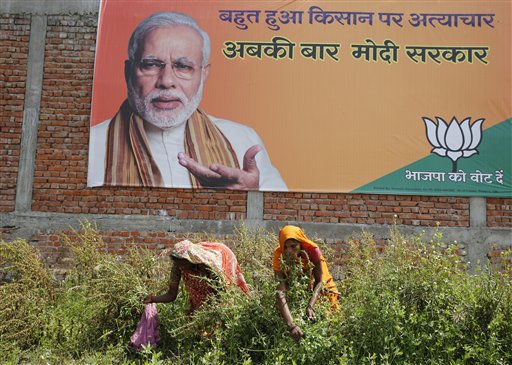
Indian female farmworkers work in a field in front of a giant billboard hung on the wall of a house displaying India’s main opposition Bharatiya Janata Party (BJP) prime ministerial candidate Narendra Modi on the outskirts of Allahabad, the northern Indian state of Uttar Pradesh, India, Sunday, April 6, 2014. India will hold national elections from April 7 to May 12, kicking off a vote that many observers see as the most important election in more than 30 years in the world’s largest democracy. AP PHOTO/ RAJESH KUMAR SINGH
DIBRUGARH, India—The first Indian voters head to the polls Monday for the world’s biggest election, set to sweep the opposition Hindu nationalists to power at a time of low growth, anger about corruption and warnings about religious unrest.
India’s 814-million-strong electorate are forecast to inflict a heavy defeat on the ruling Congress party, in power for 10 years and led by India’s famous Gandhi dynasty, after a bad-tempered campaign.
“Wherever these people (the opposition Bharatiya Janata Party) go they create fights. They’ll pit Hindus and Muslims against each other,” Rahul Gandhi warned on the eve of balloting, which begins in the remote northeast of the country.
Religious tensions, an undercurrent to the contest which has mostly focused on development until now, burst into the open on Friday when an aide of hardline opposition leader Narendra Modi was accused of inciting sentiments.
Amit Shah faces a judicial investigation after he told supporters to see the election as “revenge” against a “government that protects and gives compensation to those who killed Hindus.”
Prime ministerial front-runner Modi, the hawkish son of a tea seller whose rise has split his party, has a polarizing effect on the public due to his links to anti-Muslim religious riots in 2002.
He urged voters on Sunday to give him a majority in the 543-seat parliament in defiance of surveys which repeatedly show the BJP likely to need coalition partners.
“I need your blessings for a strong government and strong government means that not less than 300 Lok Sabha (lower house of parliament) seats,” he said Sunday.
Nine phases until May 12
Monday’s vote will take place in tea-growing and insurgency-wracked parts of the northeast, an often neglected part of the country wedged between Bangladesh, China and Myanmar.
After these first six constituencies in the states of Assam and Tripura cast their ballots, voting will take place in a further eight phases, and only finish on May 12. Results are due four days later.
In Assam, a Congress stronghold, some disgruntled voters told AFP they had been swayed by Modi’s promises of better infrastructure, strong leadership, jobs and a clean administration.
Despite a decade under Congress when growth has averaged 7.6 percent per year, a sharp slowdown since 2012 has crippled the public finances and led investment to crash.
Coupled with a widespread perception that Prime Minister Manmohan Singh’s second term was largely lost to indecision and scandal, Modi has tapped into a groundswell of discontent.
“My wife is a graduate, she is sitting at home without a job. The Congress has given us no benefit,” 42-year-old car repair shop worker Nirmal Pal told AFP in Dibrugarh.
The small town in Assam near the mighty Brahmaputra river is surrounded by tea plantations, where India’s famous export is picked by lowly paid workers who will be a decisive factor in the local result.
Boycotted but undeterred
The election will be the biggest in history and is a mind-boggling feat of organization as voters travel to nearly a million polling stations.
In 2009, officials walked for four days through snow to deliver voting machines in the Himalayas, while yaks, camels and even elephants were pressed into action elsewhere in the vast country.
Such is India’s population growth that 100 million people have joined the electoral rolls since the last vote five years ago. More than half of the country is aged under 25.
Modi, 20 years older than Gandhi at 63, is expected to score strongly among the young thanks to his message of aspiration and skills over the left-leaning Congress’s pitch of welfare and equitable development.
“Overall, they (voters) certainly think things will improve under Modi,” Sanjay Kumar, director of Delhi-based think tank the Centre for the Study of Developing Societies, told AFP before the vote.
India under Modi, an unabashed nationalist, would likely result in a more muscular foreign policy at a time when the country is emerging as a defender of the developing world on issues from climate change to global trade.
But many observers worry about his domestic impact in an officially secular country.
Modi is steeped in the ideology of Hindu nationalism, which is often antagonistic towards Muslims, and he remains tainted by religious riots in Gujarat in 2002.
More than 1,000 people, mostly Muslims, died in a spasm of violence shortly after he became chief minister, leading the United States and European powers to boycott him for more than a decade.
He has never been found guilty of wrong-doing despite multiple investigations, but a woman he appointed as a minister was jailed for life in 2012 for orchestrating some of the worst of the killing.—Pamposh Raina